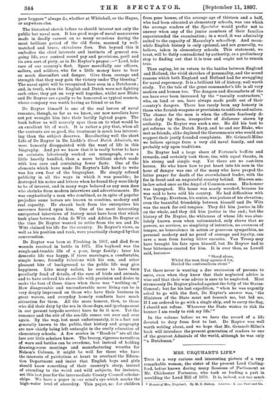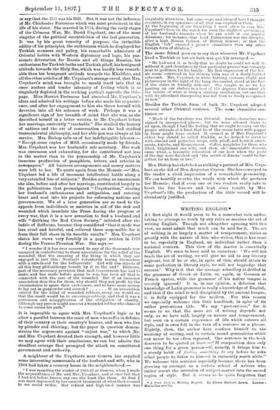MRS. URQUHART'S LIFE.* THIS is a very curious and interesting
picture of a very remarkable woman, the sister of the present Lord Carling- ford, better known during many Sessions of Parliament as Mr. Chichester Fortescue, who took so leading a part in moulding the Land Bill of 1870. It is, indeed, not too much
• Memoir of Mrs. Urquhart. By M. 0. Bishop. London : K eau Panl and Co. •
to say that the Bill was his Bill. But it was not the influence of Mr. Chichester Fortescue which was most prdininent in the life of his sister. She married in 1854, during the early stages of the Crimean War, Mr. David Urquhart, one of the most singular of the political eccentricities of the last generation.
It was by his great tenacity of purpose, the invincible oddity of his principles, the enthusiasm which he displayed for Turkish manners and policy, his remarkable admixture of Oriental habits with Western diplomacy and logic, his pas- sionate detestation for Russia and all things Russian, his enthusiasm for Turkish baths and Turkish pilaff, his benignant attitude towards the Holy See, which was hardly less remark- able than his benignant attitude towards the Khalifate, and all the other articles of Mr. Urquhart's strange creed, that Mrs.
Urquhart's mind was brought to mould itself into that at once austere and tender intensity of feeling which is so singularly depicted in the striking portrait opposite the title- page. Miss Harriet Fortescue had absorbed Mr. Urquhart's ideas and admired his writings before she made his acquaint- ance, and after her engagement to him she threw herself with devotion into all his schemes of work. Perhaps it was a significant sign of her breadth of mind that she was, as she described herself in a letter written to Mr. Urquhart before her marriage, eminently "teachable." She studied the history of nations and the art of conversation as she had studied transcendental philosophy, and her able pen was always at his service. Mrs. Bishop tells us of her indefatigable labours :— " Except some copies of MSS. occasionally made by friends, Mrs. Urquhart was her husband's sole secretary. Her work was enormous and exhausting, for she contributed not less to the matter than to the penmanship of Mr. Urquhart's immense production of pamphlets, letters, and articles in newspapers." All business arrangements and money matters were left to her. To quote again from the Memoir :—" Mrs. Urquhart led a life of incessant intellectual battle along a very extended line of subjects." Besides acting as amanuensis she also, before and after her marriage, contributed largely to the publications that promulgated " Urquhartism," sharing her husband's enthusiasms and antipathies, and entering heart and soul into his projects for reforming nations and governments. We of a later generation are so used to the appeals from individuals or societies in aid of the sick and wounded which inundate the Press during the progress of every war, that it is a new sensation to find a husband and wife " disliking the Red Cross Society," initiated after the battle of Solferino, because they considered "that it made war less cruel and hateful, and relieved those responsible for it from their full share in its terrible results." Mrs. Urquhart states her views very forcibly in a paper written in 1870 during the Franco-Prussian War. She says :—
" I wonder if it has ever occurred to any of the thousands now occupied in contributing to these associations for the relief of the wounded, that the meaning of the thing in which they are engs ged is just this : Neutrals voluntarily taxing themselves with a rate-in-aid for the belligerents ! And will the objects of all this busy philanthropy benefit by it in the end ? Hitherto, part of the necessary provision that each Government has bad to make, and has made before going to war, has been all that is connected with the care of the wounded. But if an immense association does this for them, why should they not profit by the circumstance to spare their exchequers, and so have more money to lay out in gunpowder and cannon ? if an association existed for the relief of wounded robbers, every one would see that the result would be to encourage robbery, and that it was a perversion and misapplication of the obligation of charity, although any person might succour a wounded robber who chanced to come across his path."
It is impossible to agree with Mrs. Urquhart's logic or to allow a parallel between the cases of men who suffer in defence of their country or their country's honour, and men who live
by plunder and thieving; but the paper in question demon- strates the arguments against "unjust war," to which Mr.
and Mrs. Urquhart devoted their strength, and however little we may agree with their conclusions, we can but admire the steadfast courage that prompted the attack on constituted government and authority.
A neighbour of the Urquharts near Geneva has supplied some interesting memoranda of the husband and wife, who in 1864 had taken a country house in the neighbourhood :—
" I was spending the winter of 1864-65 at Geneva, when I made the acquaintance of Mr. and Mrs. Urquhart, and at once felt that I had not before known any one the least like them. At first I was most impressed by her earnest treatment of what then seemed to me social trifles. Her refined and high-bred manner was singularly attractive; but some ways and ideas of hers I thought eccentric, in my ignorance of all that was implied in them. . . At the beginning of our friendship I used often to scan Mrs. Urquhart's face, on the watch for even the slightest questioning of her husband's remarks when he ran a-tilt at our popular delusions ; for instance, that Lord Palmerston was the defender, after a high Roman fashion, of British honour ; or that the English ' tub ' ensured a greater cleanliness than any other foreign form of ablution."
The same friend goes on to say that wherever Mr. Urquhart lived a Turkish or hot-air bath was quickly arranged :-
" He had used it so freely that no doubt he could not well do without it, and cleanliness by that particular process was certainly next to godliness for his family. My first impression of the hot- air room contrived in his Geneva villa was of a dimly-lighted catacomb. Mrs. Urquhart, in white bathing costume, slight and picturesque in the light of the lamp she carried, stood at the foot of the stairs in friendly welcome. Sho taught us as we lay panting on our shelves in a heat of 170 degrees Fahrenheit all the merits of what is truly a sanitary institution, but one that with its attendant shampooing was not then so freely recognised as now."
Besides the Turkish form of bath Mr. Urquhart adopted several other Oriental customs. The same chronicler con- tinues :-
" Much of the furniture was Oriental. Arabic characters were signed in unexpected places ; but we were allowed chairs to sit upon, though I had the feeling that we ought to carry out the proper attitude at a feast that he of the cream tarts with pepper in them might have cooked. It seemed as if Mrs. Urquhart's eldest boy should be called Aladdin, as he helped to serve us with almond and pistachio soups, with pilaff, and Li,ntisk sweet- meats, kabobs, and Kouscousson. Coffee, narghiles for those who liked, brightened our wits, and then, oh ! lamentable descent, came whist, a favourite relaxation of our host when the posts of the day were finished and 'the secret of Russia' could be for- gotten for an hour or two."
Mrs. Bishop has sketched as striking a portrait of Mrs. Urqu- hart as she did of Mrs. Augustus Craven. She has conveyed to the reader a vivid impression of a remarkable personality. We can heartily re-echo the words with which she prefaces her Memoir; that if even one or two readers really take to heart the fine lessons and high aims taught by Mrs Urquhart's life, the production of the little record will be abundantly justified.



































 Previous page
Previous page